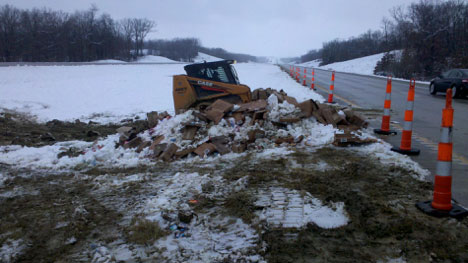Our Environmental Public Health Specialist (EPHS) supports disease prevention by promoting safe and healthy environmental conditions throughout the community for the benefit of all residents and visitors. Environmental Services may include inspections and or consultation regarding food safety/food service establishments, lodging, childcare facilities, private drinking water, domestic onsite wastewater treatment systems, and indoor air quality. Additionally, the EPHS assists the communicable disease nurse in addressing animal bites and rabies testing. Links supporting additional technical information are included in the general topic descriptions below.
Food Inspections and Food Safety
 The Macon County Health Department performs food inspections under the authority of the State of Missouri. We assist with food safety consultations, and education, and we inspect food establishments, mobile food units, and temporary food events open to the public. Food establishments include restaurants, taverns, grocery stores, convenience stores, and other food retail environments. A food establishment plan review is conducted for new facilities and major remodels. Application link for food establishments related to new facilities and major remodels. Deficiencies marked during inspections may be categorized as priority or core items. The categories define an associated risk to the factors that lead to food-borne illness and establish correction timeliness for deficiencies observed. You can check the Missouri Food Code for food establishments for more information.
The Macon County Health Department performs food inspections under the authority of the State of Missouri. We assist with food safety consultations, and education, and we inspect food establishments, mobile food units, and temporary food events open to the public. Food establishments include restaurants, taverns, grocery stores, convenience stores, and other food retail environments. A food establishment plan review is conducted for new facilities and major remodels. Application link for food establishments related to new facilities and major remodels. Deficiencies marked during inspections may be categorized as priority or core items. The categories define an associated risk to the factors that lead to food-borne illness and establish correction timeliness for deficiencies observed. You can check the Missouri Food Code for food establishments for more information.
Food establishments and managers are to establish and practice safe food handling skills to reduce the risk of foodborne illness. A Certified Food Protection Manager Exam can be a way to demonstrate knowledge of foodborne illness prevention, hazard analysis, and safe food practices to facilitate proper food establishment inspections. A couple of ways to achieve knowledge are through online educational venues, as self-paced training or by purchasing the National Restaurant Association “ServSafe” Course Book.
The Macon County Health Department’s Environmental Specialists conducts routine and follow-up inspections year-round. If you have questions regarding food safety or inspections, please call 660-395-4711.
Food recalls are generally associated with food or ingredients that may be unsafe for human consumption. This may also relate to improper labeling or lack of declaration of an allergen. Food may have been tested for contamination or bacteria related to a foodborne illness. Check MO DHSS, USDA, and FDA for food recall information.
Food safety relates to everyone and is often a concern with food that inherently has bacteria associated with products, such as raw milk. To learn more about raw milk, visit CDC raw milk Q and A and Real Raw Milk Facts
2021 Selling Local Foods in Missouri
The Missouri Department of Health and Senior Services has provided guidance on Missouri home-based kitchen food production. This discusses numerous topics such as food safety basics, regulation of food in Missouri, Missouri Cottage Law, food code exemptions, Raw Agriculture Commodities, and inspection questions.
Canned food can be important to keep at room temperature, avoid storing them at extreme temperatures, and eat before the expiration date. Check out the pocket guide to canned food defects for more safety information.
Guidance for Game Bird Processing and Sale Published 2022
Retail food establishments can donate food to help reduce waste while feeding those in need. Donated food should be handled safely and according to state and local food codes. The FDA has put together key steps to remember and follow when donating food from a retail food establishment, it can be downloaded here. Visit the FDA website for more information on food loss and waste.
Fish advisories
Fish advisories are published by the Missouri Department of Health and Senior Services and the EPA. Recommendations are made for all bodies of water where fish are caught with additional reference based on fish monitoring throughout the state. Consumption recommendations are made based on various health risks. You can view a map of fish advisories in the state of Missouri to determine any health risks in your region.
Emergency Response
In the event of distressed and/or adulterated foods and pharmaceuticals, fire, flood, weather, and highway accidents, it is the responsibility of environmental health personnel to assess the condition of any food, drugs, cosmetics, or medical devices involved in such incidents and to make sound decisions based on public health policies and procedures.
Distressed Foods

Responding to events and addressing distressed items for human consumption or use. Section 196.030, RSMo mandates the Department of Health and Senior Services (DHSS) and its representatives to embargo foods, drugs, cosmetics, or medical devices that are involved in suspected adulteration or misbranding, as a result of a transportation incident or other natural/manmade event or disaster.
Response and evaluation are conducted, as soon as possible, after accidents, truck wrecks, train derailments, fires, floods, back-up of sewage in a facility, extended interruption of power or water service, or when other natural/manmade disasters occur. Every effort is made to limit the amount of product that is embargoed (i.e. removed from commerce).

Lead
The Macon County Health Department answers lead-related questions and educates community members on the environmental hazards of lead exposure. Lead is a poisonous metal that was once commonly used in paint, toys, ceramics, and more. It may still be found in cosmetics, batteries, and other items. If your home was built before 1978, your structure may contain lead paint on walls, doors, windows, and more. Click here for additional information on lead from the United States Environmental Protection Agency.
According to the EPA, children under 6 years of age, pregnant women, and unborn fetuses face the highest risk of lead poisoning. Symptoms of lead poisoning might include fatigue, weight loss, abdominal cramps, muscle weakness, headaches, and other symptoms.
The Macon County Health Department performs lead testing. If you are concerned about lead or have additional questions, please call 660-395-4711 for more information.
Lodging Inspections
The Environmental Public Health Specialist inspects lodging facilities making assessments of Drinking Water Supply, Wastewater Handling, Sanitation/Housekeeping, Life Safety, Fire Safety, Swimming Pools/Spas, Plumbing, and Mechanical, Heating/Venting, and Air Conditioning Equipment. Where local/municipal ordinances exist with regulatory requirements, municipal regulatory authority requirements are accepted by the Health Department. This is accomplished by receiving correspondence approving the specific condition or discrepancy. Where applicable lodging inspections are conducted in conjunction with local Fire Inspectors. Those establishments meeting the sanitation and safety standards outlined in the lodging rule, 19 CSR 20-3.050, receive an approved inspection report. Re-inspections are conducted as needed.
The Macon County Health Department is happy to assist those patrons planning a trip or looking for lodging by providing the following lists of licensed and unlicensed establishments in the state of Missouri. Click on any of the links below for more information.
Rules for Lodging Establishments
MO Licensed Lodging Establishment List
Animal Bites/Rabies Testing
Please notify the Macon County Health Department of all animal bites and exposure to bats. Persons bitten or potentially exposed to rabies or their guardian are encouraged to contact the health department within 48 hours and as soon as possible is preferred. Our trained health specialists are here for post-exposure consultation and referrals for treatment options. We also coordinate testing for rabies on animals. To set up an appointment for review and possible testing, please contact us at 660-395-4711. Testing is at the discretion of the health department and not all specimens meet the requirements. Fees may apply.

Tick-borne Diseases
Ticks are common in Missouri and are known to transmit diseases to humans. Learn more about diseases ticks carry.
Home
Indoor Air
Carbon monoxide is an invisible, odorless, tasteless, and poisonous gas that can be from places like automobile engine exhaust, portable propane heaters, furnaces, water heaters, wood-burning fireplaces, and grills. Carbon monoxide can be detected in the home by installing a carbon monoxide alarm in your home.
How much ventilation do I need in my home to improve indoor air quality? Read about the EPA’s guidance on indoor air quality.
Mold and Moisture in Your Home
Mold is found both indoors and outdoors and is present everywhere – in the air and on surfaces. Mold can enter your home through open doorways, windows, vents, heating, air conditioning systems, etc. Mold will then grow in places with a lot of moisture, such as around leaks in roofs, windows, or pipes, or where there has been flooding. Mold grows well on paper products, cardboard, ceiling tiles, and wood products. Mold can also grow in paints, wallpaper, insulation, drywall, carpet, fabric, and upholstery.
Exposure to damp and moldy environments may cause a variety of health effects or none at all depending on a person’s sensitivity. For those who are sensitive, molds can cause nasal stuffiness, throat irritations, coughing or wheezing, eye and, in some cases, skin irritation. People with mold allergies may have more serious reactions.
Things you can do inside your home to control mold growth are:
- Maintain humidity levels between 40% and 60%
- Promptly fixing leaky roofs, windows, and pipes
- Thoroughly cleaning and drying after flooding
- Ventilating shower, laundry, and cooking areas
The EPA has useful information about mold and how to clean mold in your home.
Radon
Radon is considered to be the second leading cause of lung cancer in the U.S. Radon is a gaseous radioactive element that occurs from the natural breakdown of uranium in rocks and soil. It is colorless, odorless, and tasteless. Radon becomes a risk indoors because as it continues to break down, it emits atomic particles that can alter DNA and increase lung cancer risk upon entering the lungs. Radon can be tested and measured in pCi/L (picocuries per liter) and there are estimated risks to health from the exposure depending on the concentration. Missouri Department of Health and Senior Services (MO DHSS) and the Environmental Protection Agency (EPA) recommend that if the concentration of radon is 4 pCi/L or greater, then remediation should be done to lower risk.
MO DHSS is currently offering free radon kits for citizens by clicking on the free radon kit link at the bottom and filling out the form. For more information, go to the citizen’s guide to radon.
You can request a free radon testing kit from the state of Missouri to test the radon levels in your home.
Bed Bugs
Bed bugs may be difficult to identify. They may be accidentally moved and spread within clothing, suitcases, furniture, or other belongings. Often red itchy welts are an indication of a bed bug infestation and affected areas on the body may include the ankles, neckline, under the arms, or anywhere skin is exposed while sleeping as the insects are dormant during the day. Wash bite areas with antiseptic soap to reduce the risk of any infection and contact your doctor for an appointment if the welts appear to worsen. Check out the EPA’s Top Ten Tips to Prevent or Control Bed Bugs
Missouri’s landlord-tenant law: the rights & responsibilities of landlords & tenants
On-Site Wastewater Treatments Systems (OWTS)
The Macon County Environmental Public Health Specialist consults Macon County property owners to include prospective buyers and sellers regarding on-site wastewater treatment systems and related standards. State of Missouri Laws 701.025 through 701.059 and associated regulations 19CSR 20-3.060 to 20-3.080 .
Occasionally Macon County Health Department receives a formal complaint regarding an OWTS from an aggrieved party or adjacent landowner. The Macon County Health Department is required by law to notify and make an assessment of reported OWTS deficiency to determine if the system is in violation of the “701” law. The system is required to meet the rules promulgated pursuant to sections 701.025 to 701.059, including provisions relating to the construction, operation, major modification, and major repair of on-site disposal systems, when all points of the system are located in excess of ten feet from any adjoining property line and no effluent enters an adjoining property, contaminates surface waters or groundwater or creates a nuisance as determined by a readily available scientific method.
When a permit to modify or construct is required or after a violation notice regarding OWTS(s) is issued, the Missouri Department of Health and Senior Services is the regulatory authority.
Additional OWTS Information
The questions often asked: what system do I put in and how? As there are several factors that relate to the decision as to what system is best suited. Consulting a registered on-site wastewater treatment system installer is a great first step.
All state-registered installers are recognized in Macon County as state rules apply. Below is a map link listing those that have expressed interest in working in Macon County. Click on the county outline to see the list.
Registered/Licensed Onsite Wastewater Treatment System (OWTS) Installer List
Registered/Licensed Onsite Wastewater Treatment System (OWTS) Inspectors List
Registered/Licensed Onsite Wastewater Treatment System (OWTS) Onsite Soil Evaluators
Onsite Sewage Laws and Rules Reference Manual
Homeowners Information
- Residential Sewage Lagoon Systems: A Homeowner’s Guide to Installation and Maintenance
- Single Family Dwelling Lagoon Diagram: Single Family Dwelling lagoon diagram 2 pages
- Septic Tank/Absorption Field Systems: A Homeowner’s Guide to Installation and Maintenance
- University of Missouri homeowner guides
- Onsite Wastewater Treatment System (OWTS) Owner’s manual
Closing an abandoned septic system
Over time the chance of a buried tank or access lid collapsing increases, making it a safety hazard. Abandoned tanks can be a health hazard if not properly decommissioned. Generally no permit will be necessary to properly abandon a sewage tank; however, you should contact the county authority before you begin to be sure. Check with your local permitting authority for requirements. If there are no local requirements; have the tank emptied of all contents by a professional waste hauling company. You may then: 1) have the sewage tank crushed in place and then backfill the area; 2) have the empty tank completely filled with sand or gravel, remove risers, cover openings and then backfill the area; or 3) have the empty tank removed from the property and disposed at a landfill, provided the landfill can accept it, and then backfill the area. After backfilling, grade the area to shed water and seed with grass.
https://health.mo.gov/living/environment/onsite/faqs.php




Site soil is a major factor in determining the appropriate system. When a permit is required, a soil morphology report from an accredited Soil Scientist is required to assist the contractor in installing the proper system. Check for the general soil types in the county and use it as a reference point, not a final determination as to which system to install. Helpful Steps: zoom in on the map to the desired location, select the AIO in the map toolbar, draw the area shape, select the soil data explorer, select sanitary facility in the drop-down on the right-hand side of the screen, select either the absorption field or lagoon and observe the rating suitability.
State of Missouri Health and Environmental Agencies
Department of Health and Senior Services

